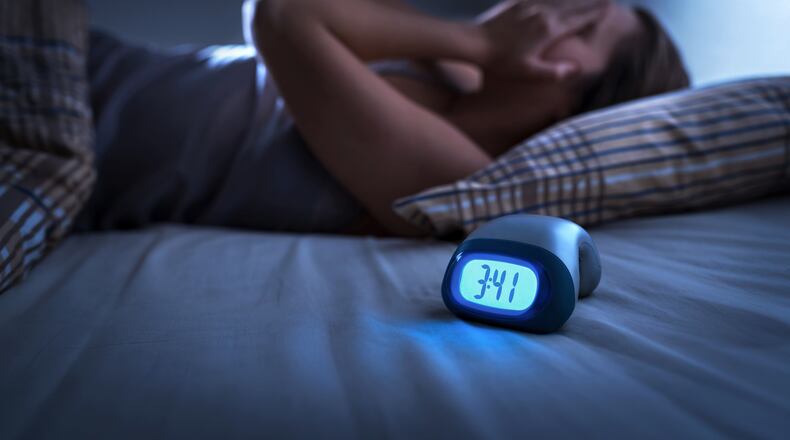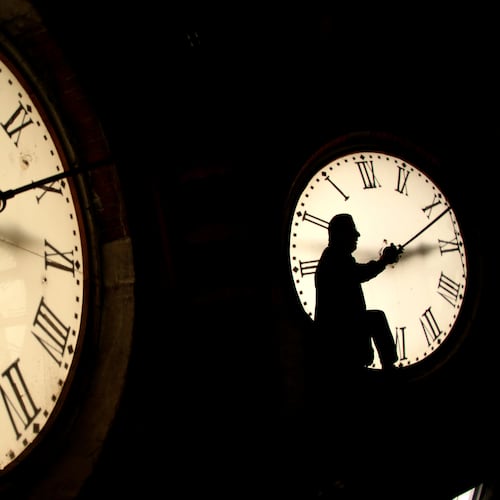An extra hour of sleep. It’s such an irresistible offer to so many of us. With over a third of all U.S. adults not getting enough slumber these days, who would dare say “no” to catching some zzz’s?
As U.S. clocks prepare to “fall back” for the end of 2025’s daylight saving time, Americans are going to gain an extra hour when the change takes effect at 2 a.m. on Nov. 2. But it’s not all sweet dreams.
For Georgia, the return to standard time brings shorter days and longer nights, making fall and winter months feel darker. From sleep disruption to seasonal depression, it can take a serious toll on your health.
Shorter days, sleepless nights
Because of the tilt of the Earth’s axis, Georgia’s daylight hours grow shorter as winter approaches. When you add the switch back to standard time, evenings get noticeably darker — fast. At the start of October, the sun set around 7:20 p.m., but by Dec. 1, it will set closer to 5:20 p.m.
“Sunlight is really important, because it drives our circadian rhythm,” Emory University professor and sleep medicine researcher Victoria Pak, Ph.D., said.
That rhythm dictates the body’s 24-hour clock, letting us know when to feel sleepy and when to feel awake. With less light exposure, our body’s production of important hormonal sleep regulators — like melatonin and serotonin — are thrown out of rhythm, she explained.
Emory Healthcare’s Dr. Michael Kraft — who once studied how time zone-spanning flight missions affect circadian rhythm as a flight surgeon with the U.S. Air Force — says it can take the body up to five days to fully adjust to the return of standard time. Even after that adjustment, the decrease in sunlight exposure can disrupt the body’s internal clock and, overtime, lead to significant health issues if sleep is disrupted long term.
“There’s been several studies that show getting consistent sleep is important,” he said. “When you’re ebbing and flowing in your sleep cycle, it actually can affect cognition. It can affect mood. It can affect your emotional state as well.”
Kraft said the golden rule for healthy sleep is about seven hours a night for most adults. According to the Atlanta-based Centers for Disease Control and Prevention, adults who sleep less than seven hours a night have a greater risk of high blood pressure, obesity and Type 2 diabetes.
Light, supplements and better sleep hygiene
So how can Georgian’s get better rest? Dr. Robyn Cotney, chief resident of Piedmont Macon‘s psychiatry program, shared some tips.
“There’s a couple of different things that they can try, one is sleep hygiene,” she said.
Good sleep hygiene simply means practicing better habits for healthier rest. That starts with turning off any bright screens — no phones or TV — at least an hour before bed. Activities like reading or scrolling can train your brain to stay alert instead of unwind.
The CDC also recommends going to bed and waking up at the same time every day. Keep your bedroom quiet, cool and relaxing. And try to avoid heavy meals, caffeine and alcohol before bed.
Piedmont Healthcare sleep specialist Dr. Rami Arfoosh said a common mistake is taking a hot shower before bedtime. Body temperature plays an important role in our ability to fall asleep and a hot shower can delay the body’s natural cooldown, making it harder to drift off.
The expert also advises skipping naps, which can interfere with nighttime sleep, and suggested journaling.
“We always talk to people about what we call a ‘worry journal’ or ‘sleep journal,’ especially for people who have insomnia problem(s), tendency to ruminate and worry about stuff close to bedtime,” Arfoosh said.
Many people turn to supplements hoping for better sleep, but it’s not always a quick fix. According to Arfoosh, a “vast majority” of the population has a vitamin D deficiency, making it one of the most beneficial supplements for poor sleepers. Still, Pak emphasized that anyone considering trying new supplements should talk with their doctor first.
“Everybody’s different,” she said. “This is something you’re going to have to talk to your health care provider about.”
It’s important to note that many supplements are not regulated by the Food and Drug Administration, meaning advertised dosages and bottle directions may not be accurate or advisable to most doctors.
The winter blues
Poor sleep isn’t the only effect of less sunlight, however. It can also lead to depression, known as seasonal affective disorder.
“Sunlight helps our bodies produce serotonin in our brain, and serotonin is the neurotransmitter that’s known to be associated with depression,” Cotney said.
Vitamin D, she explained, helps promote the production of serotonin activity. It’s why being exposed to less sunlight can lead to a “vicious cycle” where less vitamin D leads to less serotonin — and, eventually, less happiness. This is often referred to as the winter blues, a sensation of sadness tied to the colder seasons.
One way to fight the winter blues, SAD or poor sleep during the darker months is light therapy, which involves exposing the body to artificial light.
“It is like a magic box, is the best way I like to describe it,” Cotney said. “Since around the 1980s, light therapy has been one of our mainstays for treating seasonal affective disorder in particular.”
The light exposure promotes the production of what Cotney called “happy neurotransmitters,” combating the effects of seasonal depression. She warned, however, that the light is often around 20 times brighter than your average indoor light. People with sensitivity to sunlight, eye diseases or seizures should consult their doctors first.
Getting support early can make a real difference in your quality of life. Anyone suffering from social withdrawal, oversleeping, having trouble sleeping, feeling down, having less energy or gaining weight for more than two weeks should seek professional medical help.
About the Author
Keep Reading
The Latest
Featured




